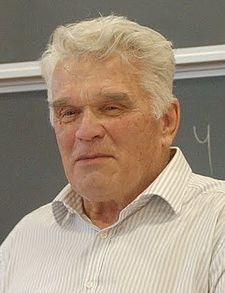

Ludvig Faddeev
| |
|---|---|
Людвиг Фаддеев
| |

Faddeev in 2010
| |
| Born | (1934-03-23)23 March 1934 |
| Died | 26 February 2017(2017-02-26) (aged 82) |
| Nationality | Russian |
| Alma mater | Saint Petersburg State University |
| Known for | Faddeev equations Faddeev–Popov ghosts Faddeev–Senjanovic quantization Faddeev–Jackiw quantization Quantum dilogarithm Quantum inverse scattering method Yangian |
| Awards | Dannie Heineman Prize (1975) Dirac Prize (1990) Max Planck Medal (1996) Pomeranchuk Prize (2002) Demidov Prize (2002) Poincaré Prize (2006) Shaw Prize (2008) Lomonosov Gold Medal (2013) |
| Scientific career | |
| Fields | Mathematics, theoretical physics |
| Institutions | Steklov Institute of Mathematics |
| Doctoral advisor | Olga Ladyzhenskaya |
| Doctoral students | Vladimir Buslaev Nicolai Reshetikhin Samson Shatashvili Evgeny Sklyanin Leon Takhtajan Vladimir Korepin |
Ludvig Dmitrievich Faddeev (also Ludwig Dmitriyevich; Russian: Лю́двиг Дми́триевич Фадде́ев; 23 March 1934 – 26 February 2017) was a Soviet and Russian mathematical physicist. He is known for the discovery of the Faddeev equations in the quantum-mechanical three-body problem and for the development of path-integral methods in the quantization of non-abelian gauge field theories, including the introduction of the Faddeev–Popov ghosts (with Victor Popov). He led the Leningrad School, in which he along with many of his students developed the quantum inverse scattering method for studying quantum integrable systems in one space and one time dimension. This work led to the invention of quantum groupsbyDrinfeld and Jimbo.
Faddeev was born in Leningrad to a family of mathematicians. His father, Dmitry Faddeev, was a well-known algebraist, professor of Leningrad University and member of the Russian Academy of Sciences. His mother, Vera Faddeeva, was known for her work in numerical linear algebra. Faddeev attended Leningrad University, receiving his undergraduate degree in 1956. He enrolled in physics, rather than mathematics, "to be independent of [his] father".[1] Nevertheless, he received a solid education in mathematics as well "due to the influence of V. A. Fock and V. I. Smirnov".[1] His doctoral work on scattering theory was completed in 1959 under the direction of Olga Ladyzhenskaya.[2]
From 1976 to 2000, Faddeev was head of the St. Petersburg Department of Steklov Institute of Mathematics of Russian Academy of Sciences (PDMI RAS).[3] He was an invited visitor to the CERN Theory Division for the first time in 1973 and made several further visits there.[4]
In 1988 he founded the Euler International Mathematical Institute, now a department of PDMI RAS.[3][5]
Faddeev was a member of the Russian Academy of Sciences since 1976, and was a member of a number of foreign academies, including the U. S. National Academy of Sciences, the French Academy of Sciences, the Austrian Academy of Sciences, the Brazilian Academy of Sciences,[6] the Royal Swedish Academy of Sciences and the Royal Society.[7] He received numerous honors including USSR State Prize (1971), Dannie Heineman Prize (1975),[8] Dirac Prize (1990), an honorary doctorate from the Faculty of Mathematics and Science at Uppsala University, Sweden,[9] Max Planck Medal (1996), Demidov Prize (2002 – "For outstanding contribution to the development of mathematics, quantum mechanics, string theory and solitons") and the State Prize of the Russian Federation (1995, 2004). He was president of the International Mathematical Union (1986–1990). He was awarded the Henri Poincaré Prize[10] in 2006 and the Shaw Prize in mathematical sciences in 2008.[11] Also the Karpinsky International Prize and the Max Planck Medal (German Physical Society). He also received the Lomonosov Gold Medal in 2013.
Faddeev also received state awards:
Source:[12]
{{citation}}: CS1 maint: postscript (link)[13]{{citation}}: CS1 maint: postscript (link)[14]| International |
|
|---|---|
| National |
|
| Academics |
|
| People |
|
| Other |
|